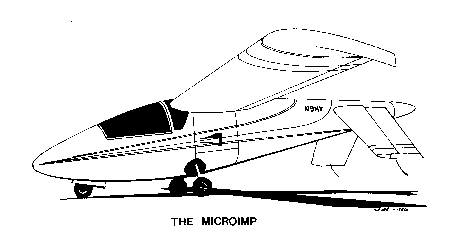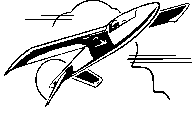
In 1978, with the success of the Mini-IMP program, Molt
Taylor and his friend, Jerry Holcomb began construction of the prototype
Micro-IMP aircraft. It was intended as an alternative to the then-new “Quickie”
aircraft, a Burt Rutan design, which was being offered by Quickie Aircraft
Company of Mojave, CA. Like the Quickie, the Micro-IMP was intended to be a very
light-weight, low-power and low cost sport plane. Molt and Jerry chose to use a
new building material that they had developed for the primary structure, a
special resin-impregnated, fiberglass-reinforced paper that they called TPG
(Taylor-Paper-Glass)
The Micro-IMP was basically a smaller, lighter version of the
Mini-IMP and embodied most of the Mini-IMP features and design ideas. It
featured a fully retractable tri-cycle landing gear, full span, reflexing
flaperons, a NASA GA-PC(1) airfoil, a unique two-position propeller and a fully
trimmable inverted “V” tail.
Molt had intended to have Wicks Aircraft Company, a leading
supplier of materials for experimental aircraft builders, provide complete kits
for the Micro-IMP, with all the parts pre-printed on the TPG paper stock, so
that the builder would only have to cut out the pieces and laminate them with
the cloth. The kit would have included all instrumentation and materials to
build the airplane. The engine which powered the prototype was an aircraft
conversion of the 620cc Citroen 2CV automobile engine which has been produce in
the millions in Europe. The engine, which was intended to put out about 32-38
h.p. simply couldn’t be persuaded to put out more than about 16-18 h.p. and
thus the prototype was severely underpowered. A planned 800 cc version of the
engine never got produced.
The Micro-IMP was finished in 1981 and was last flown at a
demonstration during Oshkosh 1982. At that time, the airframe was hung up in the
rafters at Molt’s shop awaiting inspiration, time and money to install
another, more powerful engine. Prior to Molt’s death, the “hulk” of the
Micro-IMP was sold to a teenager in the local area and its whereabouts at this
time is unknown.
The design empty weight of the prototype was 250 pounds, but
like many good attempts, that goal was not met. The actual weight of the
prototype came out at 420 pounds, and that weight, along with the reduced power
from the Citroen 2CV essentially doomed the Micro-IMP to questionable success.
That it flew at all is a testament to the excellent design of the airplane. Due
to other events, notably the Bullet 2100 project and Molt’s declining health,
the Micro-IMP was not developed further. Jerry Holcomb went on however to
develop, build and fly a refinement of the Micro-IMP design which he named the
“Perigee”. Information packages were sold but plans and kits never
materialized. Jerry might still be persuaded to resurrect the Perigee if he were
suitable persuaded. JHolcomb@pacifier.com
The limited tooling for the Micro-IMP and the production
rights to the design are in the possession of the Mini-IMP Aircraft Company.
Recently, a large collection of Molt's original drawings and shop sketches for
the Micro IMP have been found. These drawings along with a large number of
B/W photographs are being made available on a compact disk. While there are no plans
at this time for Mini-IMP Aircraft Co. to develop the design, we would be
interested in a joint venture with interested individuals or companies to
further refine and market this aircraft. Only technically competent individuals
or organizations need to apply.
If you are interested in pursuing the development of the
Micro-IMP and you meet the technical requirements, please feel free to contact
us. Additional information is available on the Micro-IMP by purchasing the
informational CD
 Mini-IMP
Aircraft Company
Mini-IMP
Aircraft Company 